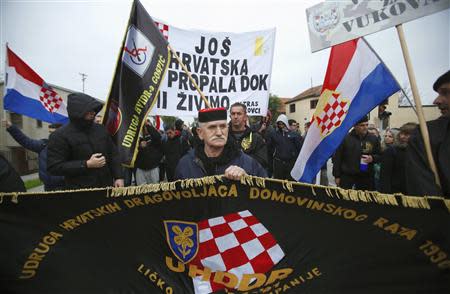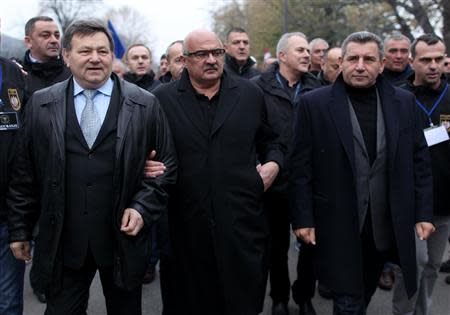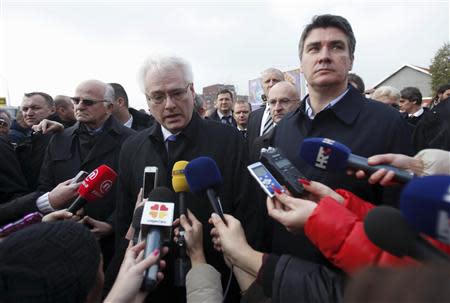Croat veterans bar government from Vukovar memorial ceremony
By Zoran Radosavljevic VUKOVAR, Croatia (Reuters) - Croatian war veterans barred state officials from ceremonies marking the anniversary on Monday of the capture of Vukovar by Serb rebels, highlighting divisions in the new European Union member state lingering from its 1991 breakaway from Yugoslavia. The conservative veterans have since February opposed the Social Democrat-led government's efforts to put up signs in both the Latin script used for Croatian and in Serb Cyrillic, in Vukovar, where inter-communal tensions still smoulder. On November 18, 1991, Yugoslav federal army forces and regional Serb militia who refused to accept Croatia's independence captured the market town on the banks of the River Danube after reducing it to rubble in a brutal three-month siege. Vukovar's fall became a cornerstone of Croatia's modern history and every year since 1991 government delegations have participated in its "Remembrance Day". On Monday, almost 100,000 people, including war veterans in wheelchairs, marched through the streets of Vukovar towards the memorial cemetery. The government delegation led by Prime Minister Zoran Milanovic and President Ivo Josipovic walked behind until the main group of marchers blocked their path and forced them to turn around to avoid incidents. A visibly frustrated Milanovic said he had come to pay respects to the Vukovar victims and would not be drawn into politicking. However, many who turned out on Monday appeared more sympathetic to the veterans. "They (the government) should have been banned from coming here in the first place. Why? Because of the Cyrillic script. Some people just don't seem to understand what happened here," said Ivana Vukasovic, a 24-year-old shop assistant. Croatia has bilingual signs, in Croatian and Italian, in the northern Adriatic Istrian peninsula, close to Italy. But the issue of Serb language and script is much more sensitive in a small republic still traumatised by the 1990s war. The veterans, organised in a group for "Protection of Croatian Vukovar", have destroyed virtually all bilingual signs the government placed on official buildings in Vukovar, and they demand a special status for the town. They want it to be exempt from laws on ethnic minorities, which give those such as Serbs the right to the official use of their language in areas where they exceed one-third of the local population. Some Vukovar residents said Monday's incident cast an ugly shadow on the annual event. "We can criticize the government, disagree with some of their decisions but no one has a right to block them from paying respect to the dead," said Darko, a 47-year old Vukovar war veteran. Milanovic's government is increasingly unpopular for failing to revive the economy and reduce high unemployment during two years in office. Many conservative Croats also deem it to be insensitive to the plight of ordinary people. (Editing by Mark Heinrich)

 Yahoo News
Yahoo News 



